
The Lost Weekend is a 1945 American drama film noir directed by Billy Wilder, and starring Ray Milland and Jane Wyman. It was based on Charles R. Jackson's 1944 novel about an alcoholic writer. The film was nominated for seven Academy Awards and won four: Best Picture, Best Director, Best Actor, and Best Adapted Screenplay. It also shared the Grand Prix at the first Cannes Film Festival, making it one of only three films—the other two being Marty (1955) and Parasite (2019)—to win both the Academy Award for Best Picture and the highest award at Cannes.

Ulzana's Raid is a 1972 American revisionist Western film starring Burt Lancaster, Richard Jaeckel, Bruce Davison and Joaquin Martinez. The film, which was filmed on location in Arizona, was directed by Robert Aldrich based on a script by Alan Sharp. It portrays a brutal raid by Chiricahua Apaches against European settlers in 1880s Arizona. The bleak and nihilistic tone of U.S. troops chasing an elusive merciless enemy has been seen as allegory to the United States participation in the Vietnam War.
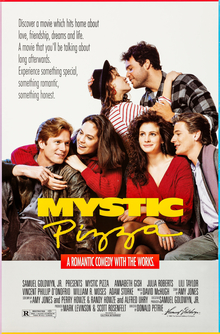
Mystic Pizza is a 1988 American romantic comedy-drama film directed by Donald Petrie in his feature directorial debut, and starring Annabeth Gish, Julia Roberts and Lili Taylor. It follows the coming-of-age of three young Portuguese-American friends who work at a pizza parlor in a seaside Connecticut town. The film received positive reviews, with Roger Ebert declaring at the time, "I have a feeling that Mystic Pizza may someday become known for the movie stars it showcased back before they became stars. All of the young actors in this movie have genuine gifts." It marked Matt Damon's film debut.
An underground film is a film that is out of the mainstream either in its style, genre or financing.
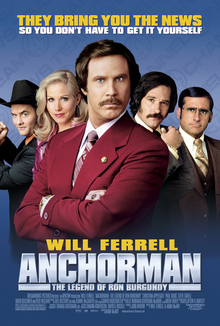
Anchorman: The Legend of Ron Burgundy is a 2004 American satirical comedy film directed by Adam McKay in his directorial debut, produced by Judd Apatow, starring Will Ferrell and Christina Applegate and written by McKay and Ferrell. The first installment in the Anchorman series, the film is a tongue-in-cheek take on the culture of the 1970s, particularly the new Action News format. It portrays a San Diego television station where Ferrell's title character clashes with his new female counterpart.
Starratings are a type of rating scale using a star glyph or similar typographical symbol. It is used by reviewers for ranking things such as films, TV shows, restaurants, and hotels. For example, a system of one to five stars is commonly used in hotel ratings, with five stars being the highest rating.

Jonathan Rosenbaum is an American film critic and author. Rosenbaum was the head film critic for The Chicago Reader from 1987 to 2008. He has published and edited numerous books about cinema and has contributed to such notable film publications as Cahiers du cinéma and Film Comment.

George Washington is a 2000 American drama film written and directed by David Gordon Green in his directorial debut. Its story centers on a group of children in a depressed small town in North Carolina who band together to cover up a tragic mistake.
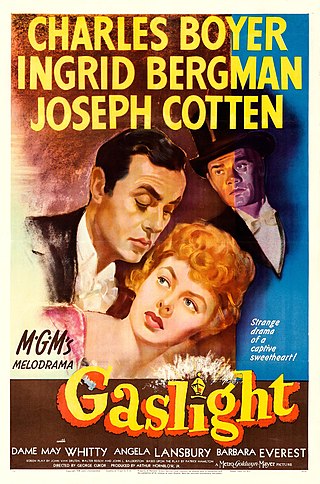
Gaslight is a 1944 American psychological thriller film directed by George Cukor, and starring Charles Boyer, Ingrid Bergman, Joseph Cotten and Angela Lansbury in her film debut. Adapted by John Van Druten, Walter Reisch, and John L. Balderston from Patrick Hamilton's play Gas Light (1938), it follows a young woman whose husband slowly manipulates her into believing that she is descending into insanity.
Emanuel Farber was an American painter, film critic and writer. Often described as "iconoclastic", Farber developed a distinctive prose style and set of theoretical stances which have had a large influence on later generations of film critics and influence on underground culture. Susan Sontag considered him to be "the liveliest, smartest, most original film critic this country has ever produced."

Breakfast of Champions is a 1999 American satirical black comedy film adapted and directed by Alan Rudolph, from Kurt Vonnegut, Jr.'s 1973 novel. The film starred Bruce Willis, Albert Finney, Nick Nolte, Barbara Hershey, Glenne Headly, Lukas Haas and Omar Epps. Though the producers entered it into the 49th Berlin International Film Festival, critics negatively received the film and was a box office bomb that was withdrawn from theatres before going into wide release. While it has been released on VHS and DVD, it has not yet been given a digital release.
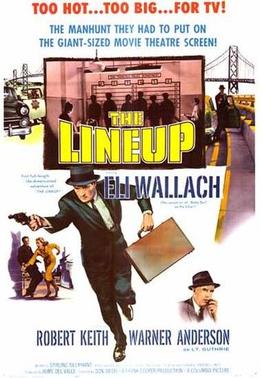
The Lineup is a 1958 American film noir version of the police procedural television series of the same title that ran on CBS radio from 1950 until 1953, and on CBS television from 1954 until 1960. The film was directed by Don Siegel. It features a number of scenes shot on location in San Francisco during the late 1950s, including shots of the Embarcadero Freeway, the California Academy of Sciences in Golden Gate Park, the War Memorial Opera House, the Mark Hopkins Hotel, and Sutro Baths.
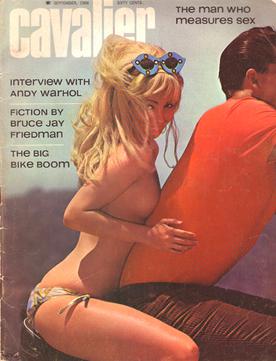
Cavalier is an American magazine launched by Fawcett Publications in 1952 which ran for decades, eventually evolving into a Playboy-style men's magazine. It has no connection with the Frank Munsey pulp The Cavalier, published in the early years of the 20th century.

Raúl Ernesto Ruiz Pino was an experimental Chilean filmmaker, writer and teacher whose work is best known in France. He directed more than 100 films.
Otis Ferguson was an American writer best remembered for his music and film reviews in The New Republic in the 1930s.
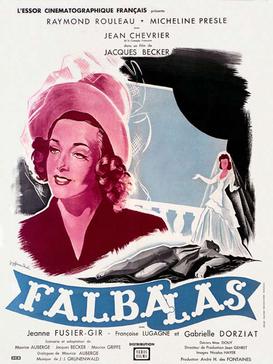
Paris Frills is a 1945 French drama film directed by Jacques Becker and starring Raymond Rouleau, Micheline Presle and Jean Chevrier. It was made in 1944 during the German occupation but not released until the following year. The film's sets were designed by the art director Max Douy. It was shot at the Francoeur Studios in Paris. Exteriors were shot in the 16th arrondissement of Paris.
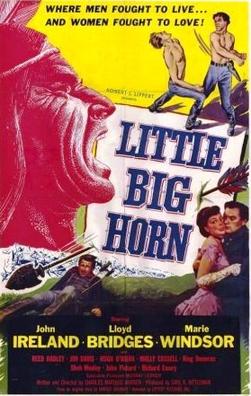
Little Big Horn is a 1951 American Western film written and directed by Charles Marquis Warren starring Lloyd Bridges, John Ireland and Marie Windsor.
Carrie Rickey is an American film critic. Rickey was a film critic for The Philadelphia Inquirer from 1986 to 2011, and has contributed to The New York Times, San Francisco Chronicle, and Village Voice.
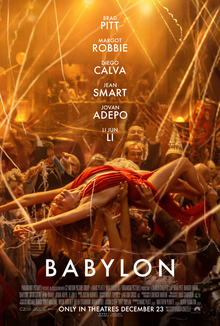
Babylon is a 2022 American epic historical black comedy-drama film written and directed by Damien Chazelle. It features an ensemble cast that includes Brad Pitt, Margot Robbie, Diego Calva, Jean Smart, Jovan Adepo and Li Jun Li. It chronicles the rise and fall of multiple characters during Hollywood's transition from silent to sound films in the late 1920s.
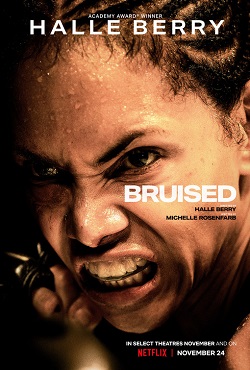
Bruised is a 2020 sports drama film starring and directed by Halle Berry in her directorial debut, who also served as the producer. It co-stars Shamier Anderson, Adan Canto, Sheila Atim, Stephen McKinley Henderson and Adriane Lenox. The screenplay was written by Michelle Rosenfarb.














